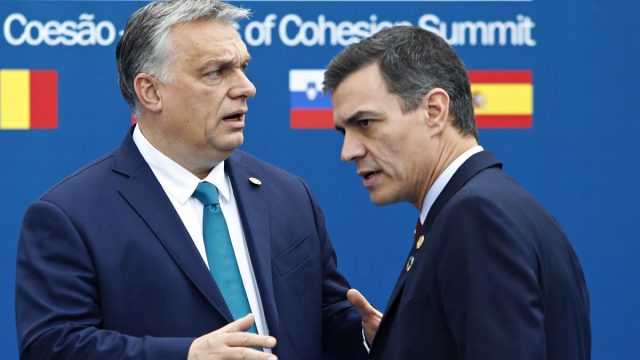Brussels has not raised any objections to the Spanish veto of a Hungarian offer to take over all of Talgo, a national manufacturer of high-speed trains.
The decision of the Spanish Executive to veto the acquisition on the part of Hungary from Talgo, a national manufacturer of high-speed trains, has received the implicit support of the European Commission, which has not expressed any objections.
“The prerogative of such decisions lies with the Member States,” a Commission spokesperson said Thursday afternoon, asked about the failed transaction, adding that: “in accordance with the EU treaties, Member States can restrict the freedoms of the single marketsuch as freedom of establishment and the free movement of capital for reasons of public security”, he also specified that these measures They must be justified and “proportionate to the objective pursued”.
The European Commission noted that any dispute between the parties would ultimately be resolved in Luxembourg, by the Court of Justice of the European Communities, and not by the Executive in Brussels.
The comments come several days after Madrid announced that would block the acquisition of 100% of Talgo for All of MagVag Europea Hungarian consortium. The failed operation was valued at 619 million euros. The Spanish Government said on Tuesday that the offer would have entailed “insurmountable risks to national security and public order”without giving more details. The statement described Talgo as a “strategic company in a key sector for the economic security, territorial cohesion and industrial development of Spain.”
Later, the newspaper El País reported that the Spanish intelligence services had prepared a report in which they raised the alarm about the consortium links with the Government of hungarian prime ministerViktor Orbán, y con Transmashholdingthe largest Russian train manufacturer and railway material. The report noted that 45% of the consortium belongs to Corvinus International Investment, a Hungarian state investment fund, while the remaining 55% comes from Magyar Vagon, a company that maintains “informal connections” with the Russian Transmashholding.
It is said that Andras Tambor, a senior executive of the consortium, has a close relationship with Orbán, something not uncommon in Hungary, where the far-right government has significantly expanded its influence over the private sector.
The possibility that Russia made with Talgo’s patented technology, which allows locomotives to change track gauge, has also come to the fore.
Geopolitical dimension
In response to the veto, Ganz MagVag announced that it would take legal action and take the matter to Brussels, bringing the bilateral conflict to the European stage. But the European Commission stated that she had not been contacted by any party, either before or after the veto announcement. “The Commission does not need to approve ex ante Spain’s decision to veto this acquisition,” declared the Commission spokesperson.
Madrid’s measure is, however, exceptional: commercial transactions between EU member states are an everyday phenomenon and almost never a source of controversy thanks to the trust that governments have in each other.
In recent years, the bloc has provided itself with new legal tools to intensify the control of foreign investments, but this only applies to non-EU companies, especially Chinese, that have set up acquisitions of national companies in critical fields.
The veto raises fears that decrease confidence in the single market as a consequence of the Hungary’s insistence on developing ties with Russiaopenly defying Western sanctions. Orbán’s self-styled “peace mission,” which took him to Moscow in early July to meet Vladimir Putin, provoked angry protests and the boycott of Hungary’s semiannual presidency of the Council of the EU, scheduled until December 31.
The news coincides with a growing controversy on Budapest’s decision to relax visa requirements for Russian and Belarusian guest workers. Brussels warns that the changes could facilitate access to the EU “possible Russian spies and saboteurs”endangering the safety of the Schengen areaexempt from passports.







